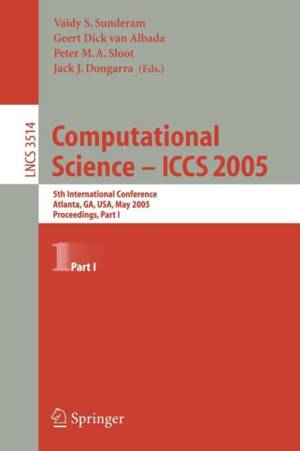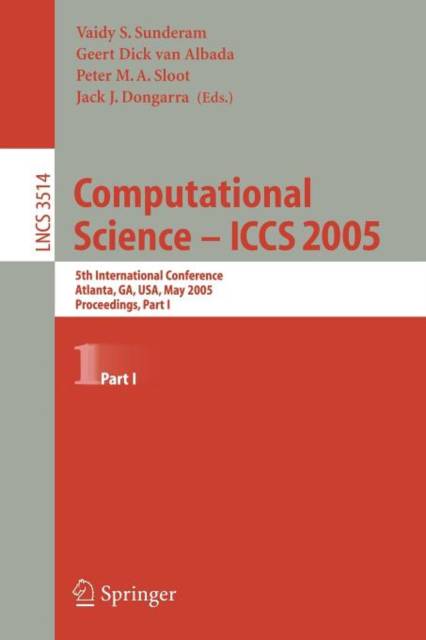
Je cadeautjes zeker op tijd in huis hebben voor de feestdagen? Kom langs in onze winkels en vind het perfecte geschenk!
- Afhalen na 1 uur in een winkel met voorraad
- Gratis thuislevering in België vanaf € 30
- Ruim aanbod met 7 miljoen producten
Je cadeautjes zeker op tijd in huis hebben voor de feestdagen? Kom langs in onze winkels en vind het perfecte geschenk!
- Afhalen na 1 uur in een winkel met voorraad
- Gratis thuislevering in België vanaf € 30
- Ruim aanbod met 7 miljoen producten
Zoeken
Computational Science -- Iccs 2005
5th International Conference, Atlanta, Ga, Usa, May 22-25, 2005, Proceedings, Part I
€ 167,95
+ 335 punten
Omschrijving
The Fifth International Conference on Computational Science (ICCS 2005) held in Atlanta, Georgia, USA, May 22-25, 2005, continued in the tradition of p- vious conferences in the series: ICCS 2004 in Krakow, Poland; ICCS 2003 held simultaneously at two locations, in Melbourne, Australia and St. Petersburg, Russia; ICCS 2002 in Amsterdam, The Netherlands; and ICCS 2001 in San Francisco, California, USA. Computational science is rapidly maturing as a mainstream discipline. It is central to an ever-expanding variety of ?elds in which computational methods and tools enable new discoveries with greater accuracy and speed. ICCS 2005 wasorganizedasaforumforscientistsfromthecoredisciplinesofcomputational science and numerous application areas to discuss and exchange ideas, results, and future directions. ICCS participants included researchers from many app- cation domains, including those interested in advanced computational methods for physics, chemistry, life sciences, engineering, economicsand ?nance, arts and humanities, as well as computer system vendors and software developers. The primary objectives of this conference were to discuss problems and solutions in allareas, toidentifynewissues, toshapefuturedirectionsofresearch, andtohelp users apply various advanced computational techniques. The event highlighted recent developments in algorithms, computational kernels, next generation c- puting systems, tools, advanced numerical methods, data-driven systems, and emerging application ?elds, such as complex systems, ?nance, bioinformatics, computational aspects of wireless and mobile networks, graphics, and hybrid computation.
Specificaties
Betrokkenen
- Uitgeverij:
Inhoud
- Aantal bladzijden:
- 1089
- Taal:
- Engels
- Reeks:
- Reeksnummer:
- nr. 3514
Eigenschappen
- Productcode (EAN):
- 9783540260325
- Verschijningsdatum:
- 12/05/2005
- Uitvoering:
- Paperback
- Formaat:
- Trade paperback (VS)
- Afmetingen:
- 156 mm x 234 mm
- Gewicht:
- 1587 g

Alleen bij Standaard Boekhandel
+ 335 punten op je klantenkaart van Standaard Boekhandel
Beoordelingen
We publiceren alleen reviews die voldoen aan de voorwaarden voor reviews. Bekijk onze voorwaarden voor reviews.








